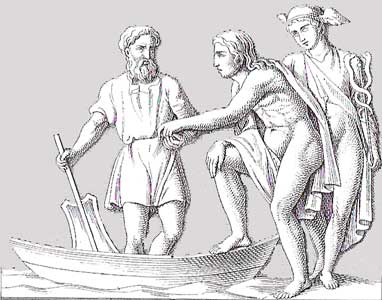.
Barbarians are not beauty-lovers; they are money-lovers. Lucian (120-190 AD) The Hall. Who are these Barbarians, are the Romans included with their Pecunia non olet (assumed to be said by the Emperor Vespasian) ?

Oikos a Greek word for "house, habitation" from which the word ecumene is derived "the inhabited world " and economy (oikonomia) (household management)
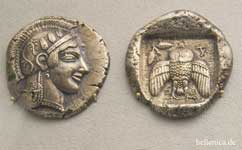
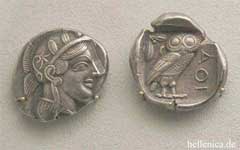
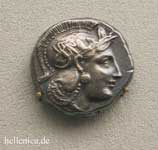
Money in form of coins is as strange as sounds one of the main reasons for the scientific revolution that started in the Ionian Greek islands. It abstracted the value of commodities or objects in exchange and helped to initiate a new mode of abstract thinking. It also was important for political changes: from the aristocratic to the system of tyrants (often wealthy persons) and then to the democratic system.
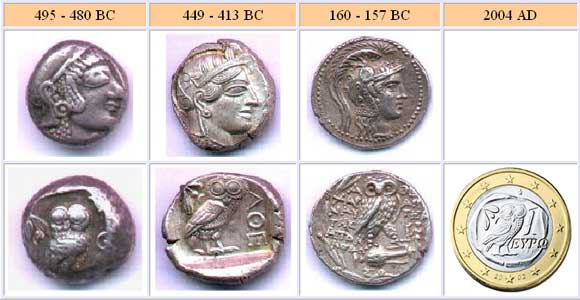
Development of the Athenian Silver Tetradrachma and the Greek 1 Euro version today (Designer: G.Stamatopoulos). Athena and the Owl (Who brings owls to Athens? Aristophanes Birds (an expression for something totally unnecessary ))
For a period of 1000 years and considering the small cities states and the colonies we can assume that there exists a rich set of different coins. The drachma (Δραχμή) was a currency that also the new Greek State adopted and that is now replaced by the EURO. This ends the history of the drachma which lasted for more than 1 millennium.
drachma (pl. drachmae) (Δραχμή)
talent (Τάλαντο)
obolos (pl. oboloi) (lat. obolus) (Οβολός), “I shall not have to pay an obolus of all the debts I have contracted on your account. Aristophanes, Clouds (The Germans use to say "seinen Obolus entrichten,.... to pay his obolus"...)”
mina or mna (pl. minae) (Μνα)
Money was divided in :1 talent = 60 minae = 6000 drachmae = 36000 oboloi
Variants didrachma (Δίδραχμο ) or stater (Στατήρας), tetradrachma (Τετράδραχμο) (with Athena and the owl or short “owl”), decadrachma (2, 4 and 10 drachmae respectively), chalkoi (1/8 obolos)
Also other smaller weights:
tetrobol = 4 oboloi
triobol = 3 oboloi
diobol = 2 oboloi
trihemiobol = 1 ½ oboloi
tritartemorion = 3/4 oboloi
hemiobol = 1/2 oboloi
trihemitartemorion = 3/8 oboloi
tetartemorion =1/4 oboloi
hemitartemorion =1/8 oboloi
Moreover, as the foot is the sixth part of a man’s height, they contend, that this number, namely six, the number of feet in height, is perfect: the cubit, also, being six palms, consequently consists of twenty-four digits. Hence the states of Greece appear to have divided the drachma, like the cubit, that is into six parts, which were small equal sized pieces of brass, similar to the asses, which they called oboli; and, in imitation of the twenty-four digits, they divided the obolus into four parts, which some call dichalca, others trichalca. Vitruvius, de Architectura
Also different versions exists for example Aegina or Athenian Drachma. The main Greek Coins (including that used by Greeks for example in Minor Asia - Persia) are:
|
Authority |
Denomination |
Standard |
Weight (g) |
|
AEGINA |
didrachma |
Aeginetic |
12.20 |
|
|
drachma |
Aeginetic |
6.10 |
|
ATHENS |
decadrachma |
Attic |
43.25 |
|
|
tetradrachma |
Attic |
17.20 |
|
|
drachma |
Attic |
4.30 |
|
|
obol |
Attic |
0.72 |
|
CORINTH |
didrachma |
Attic |
8.60 |
|
CYZICUS |
electrum stater |
Phocaic |
16.01 |
|
LYDIA |
electrum stater |
Persic |
14.20 |
|
|
gold stater |
Persic |
10.90 |
|
|
silver state |
Persic |
5.55 |
|
PERSIA |
gold daric |
Persic |
8.35 |
|
Silver siglos |
Persic |
5.35 |
|
|
PHOENICIA |
shekel |
Phoenician |
7.00 |
|
SYRACUSE |
decadrachma |
Attic |
43.25 |
|
|
tetradrachm |
Attic |
17.20 |
|
|
drachma |
Attic |
4.30 |
Many Greek coins seems not to have any number showing their value like today coins (it was specified by the weight). The variety is very large and many coins show animals, goats, eagles, horses, owls, the Pegasus or strange creatures like the man-headed bull (River god Gela/ Sicily).
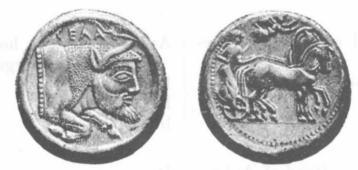
See also:
The world's most valuable coin, the Aitna tetradrachm.(2MB PDF)
My friend, you are an Athenian and belong to a city which is the greatest and famous in the world for its wisdom and strength. Are you not ashamed that you give your attention to acquiring as much money as possible, and similarly with honour and reputation, and care so little about wisdom and truth and the greatest improvement of the soul, which you never regard or heed at all?
.. For I do nothing but go about persuading you all, old and young alike, not to take thought for your persons or your properties, but for the highest welfare of your souls, proclaiming as I go, ‘Wealth does not bring goodness, but goodness brings wealth and every other blessing, both to the individual and to the State.’ This is my teaching, and if this is the doctrine which corrupts the youth, I am a mischievous person. But if any one says that this is not my teaching, he is speaking an untruth. Socrates, in Plato's The Apology
Cleanthes of Assus “called The Ass”, wrestler (starting his philosophical career with 4 drachmae)
TIMELINE
Around 600 BC Greeks adopt Coins Idea from Lydia. The first Coins from Lydia were made in the 7th century BC from electrum a mixture of silver and gold. The shape of the coins was irregular with a picture on only one side.
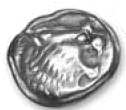
Aegina (c. 595 BC), Athens (c. 575 BC), and Corinth (c. 570 BC) start to mint their own coins. Prior to the introduction of coinage the Athenians had used iron spits or elongated nails as money.
546 BC Production of Athenian Owls Coins by the tyrant Peisistratus, using silver from the Laurion mines 25 miles south of Athens.
c. 490 BC Discovery of a Rich Seam of Silver in the Laurion Mines. Themistocles subsequently persuades the Athenians to use some of the proceeds to build a fleet of 200 warships.
456 BC Athens forces Aegina to take Athenian owls and to stop minting her own turtle coinage
449 BC Athens issues an edict ordering all foreign coins to be handed in to the Athenian mint and compelling all her allies to use the Attic standard of weights, measures and money.
c. 407 BC Sparta captures the Athenian silver mines at Laurion and releases 20000 slaves. Athens issues bronze coins with a silver coating . The Athenian public hoards silver coins which, as a result, quickly disappear from circulation, leaving only the inferior bronze ones.
394 - 371 BC Pasion, a slave, becomes the wealthiest and most famous Greek banker and gains his freedom and Athenian citizenship in the process. Greek banking transactions are carried out primarily in cash.
c. 350 BC Normal rate of interest in Greece is 10% except for risky business. According to Demosthenes 10% is the normal rate of interest for run-of-the-mill business. For risky business such as lending for shipping rates of between 20% and 30% are normal.
336 - 323 BC Reign of Alexander the Great. During the conquest of Asia Minor the cost of maintaining Alexander's army reaches about 20 talents or half a ton of silver a day but later enormous quantities of Persian bullion are captured. The coining of the previously stagnant Persian gold stocks and payments to Alexander's soldiers, many of whom settle in new towns founded by him, give an enormous stimulus to trade throughout his empire. Alexander also simplifies the exchange rate between silver and gold by fixing it at 10 units of silver equals one of gold.
323 - 30 BC Empire of the Ptolemies in Egypt. For long before Egypt came under Greek control grain had been used as a form of money in addition to precious metals, and state granaries functioned as banks. The Ptolemies transform the local warehouse deposit system into a fully integrated giro system with a central bank in Alexandria. Payments are made by transfer from one account to another without money passing.
c. 300 BC Romans adopt coinage from Greeks.
c. 200 BC Delos, a Greek island, becomes a prominent banking center and financial center. Transactions are carried out by giro or credit transfer.
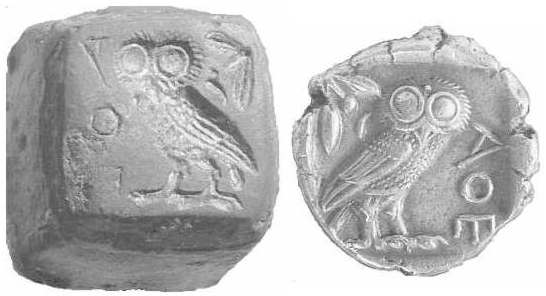
A matrix used for the production of coins
Xenophon in On Revenues (Gutenberg Text) discusses means by which a city can become richer: Trade with foreigners, immigration policy, reduction of war expenses and exploitation of silver mines. What is more useful for the citizens, public or private ownership of these mines?
Ancient Greeks' Practices and Contributions in Public and Entrepreneurship Decision Making
Athens was not so poor as many suggest at least in the period 480-404 BC and the Athenians including the military personal were paid quite good:
Athenian Empire: 480-404 BC Coinage and Finances: Revenues of the Athenian State
QUOTATIONS
A man's homeland is wherever he prospers. Aristophanes, Wealth (Plutus), 388 BC
Aristotle notes that some men are too narrow-minded to use their wealth, and others are too foolish to keep it -- one is a slave to his gains, the other is a slave to his pleasures. Plutarch, Pelopidas
Oracle of Delphi and Glaucus
Herodotus , Book VI
“Men of Athens, act which way you choose—give me up the hostages, and be righteous, or keep them, and be the contrary. I wish, however, to tell you what happened once in Sparta about a pledge. The story goes among us that three generations back there lived in Lacedaemon one Glaucus, the son of Epicydes, a man who in every other respect was on a par with the first in the kingdom, and whose character for justice was such as to place him above all the other Spartans. Now to this man at the appointed season the following events happened. A certain Milesian came to Sparta and, having desired to speak with him, said—‘I am of Miletus, and I have come hither, Glaucus, in the hope of profiting by thy honesty. For when I heard much talk thereof in Ionia and through all the rest of Greece, and when I observed that whereas Ionia is always insecure, the Peloponnese stands firm and unshaken, and noted likewise how wealth is continually changing hands in our country, I took counsel with myself and resolved to turn one-half of my substance into money, and place it in thy hands, since I am well assured that it will be safe in thy keeping. Here then is the silver—take it—and take likewise these tallies, and be careful of them; remember thou art to give back the money to the person who shall bring you their fellows.’ Such were the words of the Milesian stranger; and Glaucus took the deposit on the terms expressed to him. Many years had gone by when the sons of the man by whom the money was left came to Sparta, and had an interview with Glaucus, whereat they produced the tallies, and asked to have the money returned to them. But Glaucus sought to refuse, and answered them: ‘I have no recollection of the matter; nor can I bring to mind any of those particulars whereof ye speak. When I remember, I will certainly do what is just. If I had the money, you have a right to receive it back; but if it was never given to me, I shall put the Greek law in force against you. For the present I give you no answer; but four months hence I will settle the business.’ So the Milesians went away sorrowful, considering that their money was utterly lost to them. As for Glaucus, he made a journey to Delphi, and there consulted the oracle. To his question if he should swear, and so make prize of the money, the Pythoness returned for answer these lines following:—
Best for the present it were, O Glaucus, to do as thou wishest,
Swearing an oath to prevail, and so to make prize of the money.
Swear then- death is the lot e’en of those who never swear falsely.
Yet hath the Oath-God a son who is nameless, footless, and handless;
Mighty in strength he approaches to vengeance, and whelms in destruction,
All who belong to the race, or the house of the man who is perjured.
But oath- keeping men leave behind them a flourishing offspring.
Glaucus when he heard these words earnestly besought the god to pardon his question; but the Pythoness replied that it was as bad to have tempted the god as it would have been to have done the deed. Glaucus, however, sent for the Milesian strangers, and gave them back their money. And now I will tell you, Athenians, what my purpose has been in recounting to you this history. Glaucus at the present time has not a single descendant; nor is there any family known as his—root and branch has he been removed from Sparta. It is a good thing, therefore, when a pledge has been left with one, not even in thought to doubt about restoring it.”

Production methods
LINKS
A Manual of Greek Numismatics
Costs and Payments in ancient Rome and Greece
Law and Economy in Classical Athens: Demosthenes Against Dionysodorus
| Ancient Greece
Science, Technology , Medicine , Warfare, , Biographies , Life , Cities/Places/Maps , Arts , Literature , Philosophy ,Olympics, Mythology , History , Images Medieval Greece / Byzantine Empire Science, Technology, Arts, , Warfare , Literature, Biographies, Icons, History Modern Greece Cities, Islands, Regions, Fauna/Flora ,Biographies , History , Warfare, Science/Technology, Literature, Music , Arts , Film/Actors , Sport , Fashion --- |


